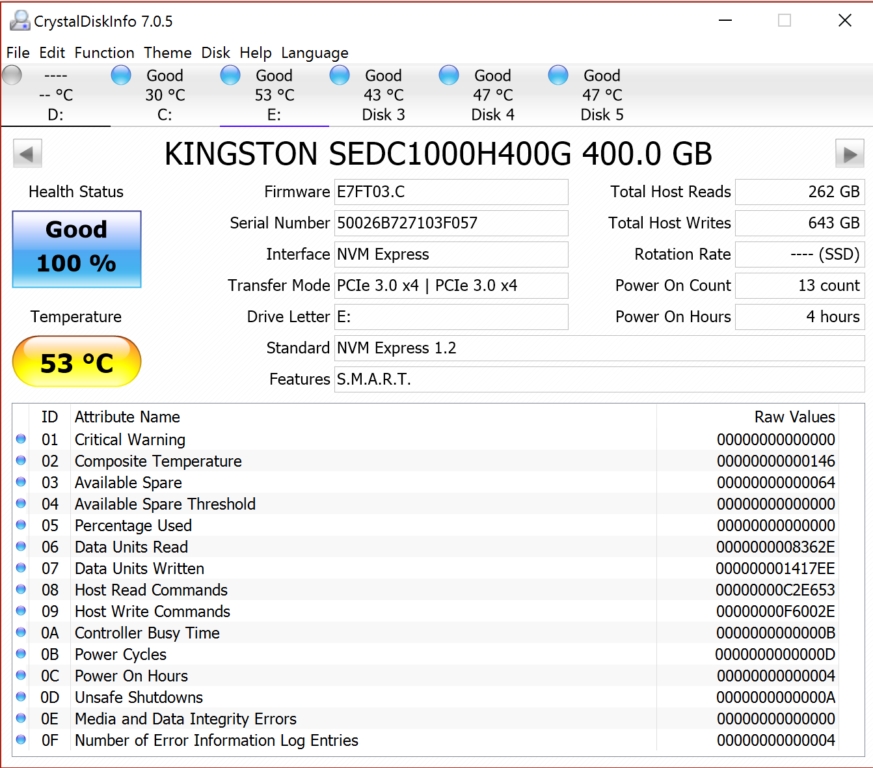KINGSTON DCP1000 400GB M.2 TESTS
Since we had disassembled the Kingston DCP1000, we thought we might start with some tests on the Kingston 400GB M.2 NVMe PCIe 3.0 x4 SSD on its own first. When examining the Crystal Disk Info information when RAID is configured, each individual volume was always recognized on its own, much like AS SSD.
CRYSTAL DISK INFO VER. 7.0.5
Crystal Disk Info is a great tool for displaying the characteristics and health of storage devices. It displays everything from temperatures, the number of hours the device has been powered, and even to the extent of informing you of the firmware of the device.
ATTO Disk Benchmark is perhaps one of the oldest benchmarks going and is definitely the main staple for manufacturer performance specifications. ATTO uses RAW or compressible data and, for our benchmarks, we use a set length of 256mb and test both the read and write performance of various transfer sizes ranging from 0.5 to 8192kb. Manufacturers prefer this method of testing as it deals with raw (compressible) data rather than random (includes incompressible data) which, although more realistic, results in lower performance results.
CRYSTAL DISK BENCHMARK VER. 5.2.1 X64
Crystal Disk Benchmark is used to measure read and write performance through a sampling of random data which is, for the most part, incompressible. Performance is virtually identical, regardless of data sample so we have included only that using random data samples.
The toughest benchmark available for solid state drives is AS SSD as it relies solely on incompressible data samples when testing performance. For the most part, AS SSD tests can be considered the ‘worst case scenario’ in obtaining data transfer speeds and many enthusiasts like AS SSD for their needs. Transfer speeds are displayed on the left with IOPS results on the right.
ANVIL STORAGE UTILITIES PROFESSIONAL
Anvil’s Storage Utilities (ASU) are the most complete test bed available for the solid state drive today. The benchmark displays test results for, not only throughput but also, IOPS and Disk Access Times. Not only does it have a preset SSD benchmark, but also, it has included such things as endurance testing and threaded I/O read, write and mixed tests, all of which are very simple to understand and use in our benchmark testing.
PCMARK VANTAGE
PCMARK 8
We can see right off that write data transfer speeds that range from 1.6GB/s in CDM to as low as 1.3MB/s in Anvil. For what it may be worth, test highs are 2.9GB/s read, 2.8GB/s write and 149K IOPS. Rather encouraging, however, are the AS SSD Copy Benchmark results which are very fast.
 The SSD Review The Worlds Dedicated SSD Education and Review Resource |
The SSD Review The Worlds Dedicated SSD Education and Review Resource | 


As expected, the Kingston DCP1000 is an absurdly powerful PCI-e SSD, especially when it comes to Real World File Transfers. It’s only caveat for me, being that all 4 M.2 SSD’s cannot be configured as a boot volume.
Yes… but imagine going the 1/3 route where the first SSD is still pushing over 2GB/s while the remaining three have to be reaching above 5GB/s. I should have tested this specifically but never had the idea until it was shipped off for our enterprise testing.
Les, maybe if you had an Intel DC P3700 on hand, you could’ve done some File Copy tests with the Kingston DCP1000
Yes that would have been possible but comparing any similar enterprise storage resource in a simple file transfer test isn’t really a fair proposition. It is like putting it beside the P4800x and forming opinion on file transfer where the DCP1000 would destroy the P4800…. until of course they are put side by side in true server settings and that P4800 has no settling whatsoever for steadystate.
You’re linking to an old AS SSD https://www.guru3d.com/files-details/as-ssd-benchmark.html is the new one idk about the other softwares you’re linking to!
I’d be curious how the PCIe host card performed with several other M.2 drives installed. This would be a quick and dirty way to get four Samsung 960 Pro’s into a system.
Also curious how it would have handled a single 4x PCIe 3.0 based M.2 drive when put into an older system with an 8x PCIe 2.0 slot. That’d be one way to provide more bandwidth to an older system.